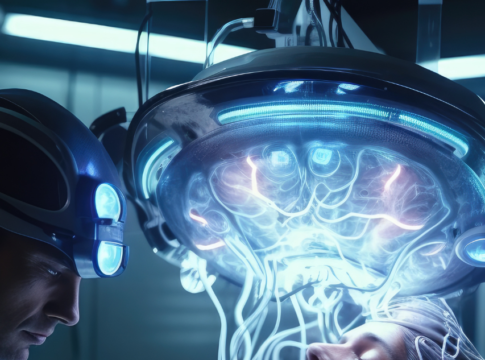Artificial intelligence (AI) is becoming a powerful tool in the realm of mental health care, offering new approaches to diagnosing, monitoring, and treating mental health conditions. With mental health challenges like anxiety, depression, and stress on the rise, AI’s ability to provide timely interventions and personalized care is a breakthrough in addressing the global mental health crisis. By leveraging machine learning, natural language processing (NLP), and data analytics, AI is reshaping how individuals receive mental health support.
AI in Mental Health Diagnosis
One of the most significant contributions of AI in mental health care is its role in early diagnosis and assessment. AI systems can analyze data from various sources, including text inputs, speech patterns, facial expressions, and physiological data, to detect signs of mental health issues. For example, AI-powered tools can identify patterns in social media posts, text messages, or voice recordings to assess an individual’s emotional state and flag potential concerns such as depression or anxiety.
Machine learning algorithms can also analyze large datasets to identify trends that may not be apparent to clinicians. By examining patient histories, behavior patterns, and responses to treatment, AI can aid in diagnosing mental health disorders more accurately and quickly, potentially leading to earlier intervention and better outcomes.
Personalized Treatment with AI
Personalized treatment is another area where AI is making a significant impact. Each individual’s mental health journey is unique, and finding the right treatment plan can often be a process of trial and error. AI tools can analyze a patient’s specific symptoms, medical history, and preferences to recommend personalized treatment plans, whether that involves therapy, medication, or lifestyle changes.
AI-powered chatbots and virtual therapists are already being used to provide mental health support, offering a form of cognitive behavioral therapy (CBT) or guided meditation. These AI-driven platforms can engage in conversation with users, helping them manage stress, anxiety, or depressive symptoms by delivering tailored therapeutic interventions. Virtual therapists also offer the benefit of accessibility, providing mental health support to individuals in underserved areas or those who may not have immediate access to a human therapist.
Continuous Monitoring and Predictive Analytics
AI also excels in providing continuous monitoring of patients’ mental health. Wearable devices and mobile apps can track physiological indicators such as heart rate, sleep patterns, or physical activity levels, all of which can be indicative of an individual’s mental well-being. AI algorithms can then analyze these patterns in real-time, alerting healthcare providers to any concerning changes that may signal a mental health crisis.
Additionally, AI’s predictive capabilities allow it to forecast the likelihood of a mental health episode based on historical data, giving patients and clinicians a chance to intervene before symptoms escalate. This proactive approach could significantly reduce the risk of severe mental health episodes and hospitalizations.
Challenges and Ethical Considerations
Despite these promising advancements, there are challenges and ethical considerations to address when using AI in mental health care. Privacy and data security are critical concerns, as AI systems often handle sensitive personal information. Ensuring that this data is stored securely and used responsibly is essential for maintaining trust in AI-driven mental health solutions.
Furthermore, AI tools are not yet fully equipped to handle complex human emotions and the nuances of mental health treatment. While they can provide support and monitoring, human oversight and intervention remain crucial for providing comprehensive care.
Conclusion
AI is transforming mental health care by offering new ways to diagnose, treat, and monitor mental health conditions. With the ability to provide personalized care, continuous monitoring, and early intervention, AI has the potential to improve access to mental health services and enhance patient outcomes. However, as this technology evolves, careful attention must be paid to privacy concerns and the ethical use of AI in mental health settings.
